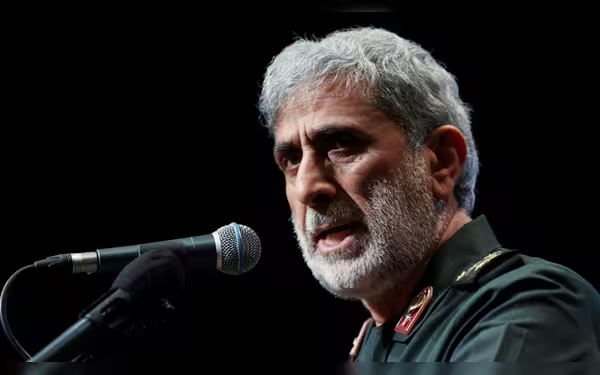Saturday, November 16, 2024 05:37 PM
Iran's Quds Force Chief Esmail Qaani Missing After Beirut Strikes
- Esmail Qaani uncontactable post-Beirut airstrikes.
- Hezbollah's Hashem Safieddine targeted in recent attacks.
- Israel continues military operations against Iran-backed groups.
 Image Credits: arabnewspk
Image Credits: arabnewspkEsmail Qaani, chief of Iran's Quds Force, has been unreachable following airstrikes in Beirut targeting Hezbollah's leadership.
In recent developments, the commander of Iran's Quds Force, Esmail Qaani, has reportedly gone silent following a series of airstrikes in Beirut. This situation arises in the wake of heightened tensions in the region, particularly after the assassination of Hezbollah leader Sayyed Hassan Nasrallah in an Israeli airstrike last month. The Quds Force, which is a key part of Iran's Revolutionary Guards, plays a significant role in managing Iran's military operations abroad, especially in Lebanon through its support for Hezbollah.
According to two senior Iranian security officials, Qaani was present in the southern suburbs of Beirut, an area known as Dahiyeh, during the recent strikes that targeted senior Hezbollah official Hashem Safieddine. However, it was clarified that Qaani was not meeting with Safieddine at the time of the attack. The situation has become increasingly complex, as a Hezbollah official indicated that Israel is obstructing efforts to locate Safieddine following the bombings.
Safieddine is viewed as a potential successor to Nasrallah, making his fate particularly significant for Hezbollah and its supporters. The Iranian officials have expressed concern, stating that they have been unable to establish contact with Qaani since the strikes occurred. This lack of communication raises questions about his safety and the broader implications for Iran's influence in the region.
Israeli military spokesperson Lt. Col. Nadav Shoshani commented on the situation, noting that the results of the strikes are still being evaluated. He confirmed that Israel had targeted Hezbollah's intelligence headquarters in Beirut, emphasizing the ongoing military campaign against the Iran-backed group.
The Quds Force, which oversees Iran's relationships with various militias across the Middle East, is crucial in shaping Iran's foreign policy and military strategy. The recent events highlight the precarious balance of power in the region, where the actions of one group can have far-reaching consequences for others.
As the situation unfolds, the international community watches closely. The potential implications of Qaani's disappearance could affect not only Iran and Hezbollah but also the broader geopolitical landscape in the Middle East. Understanding these dynamics is essential for grasping the complexities of regional conflicts and the ongoing struggle for power among various factions.













